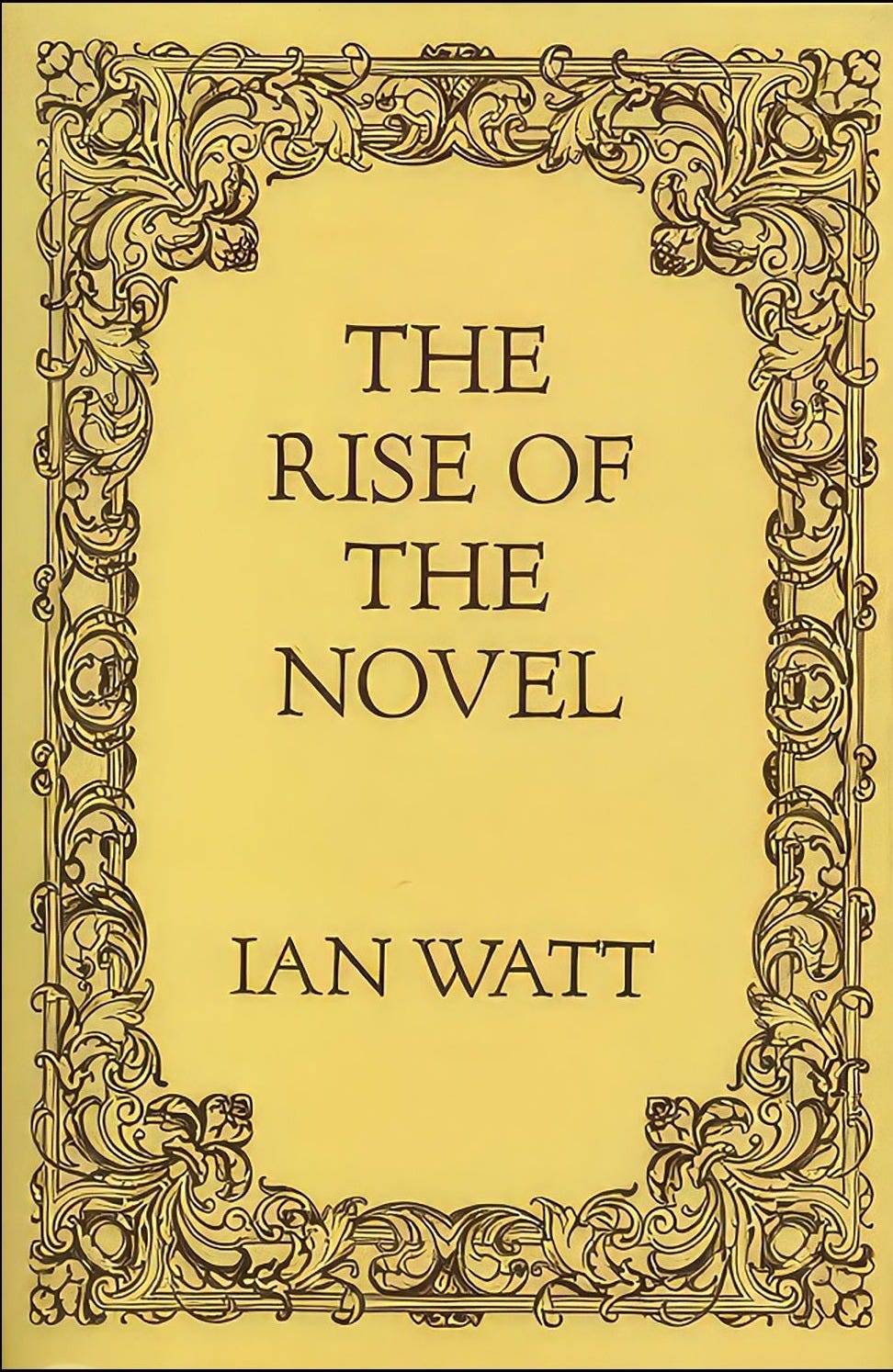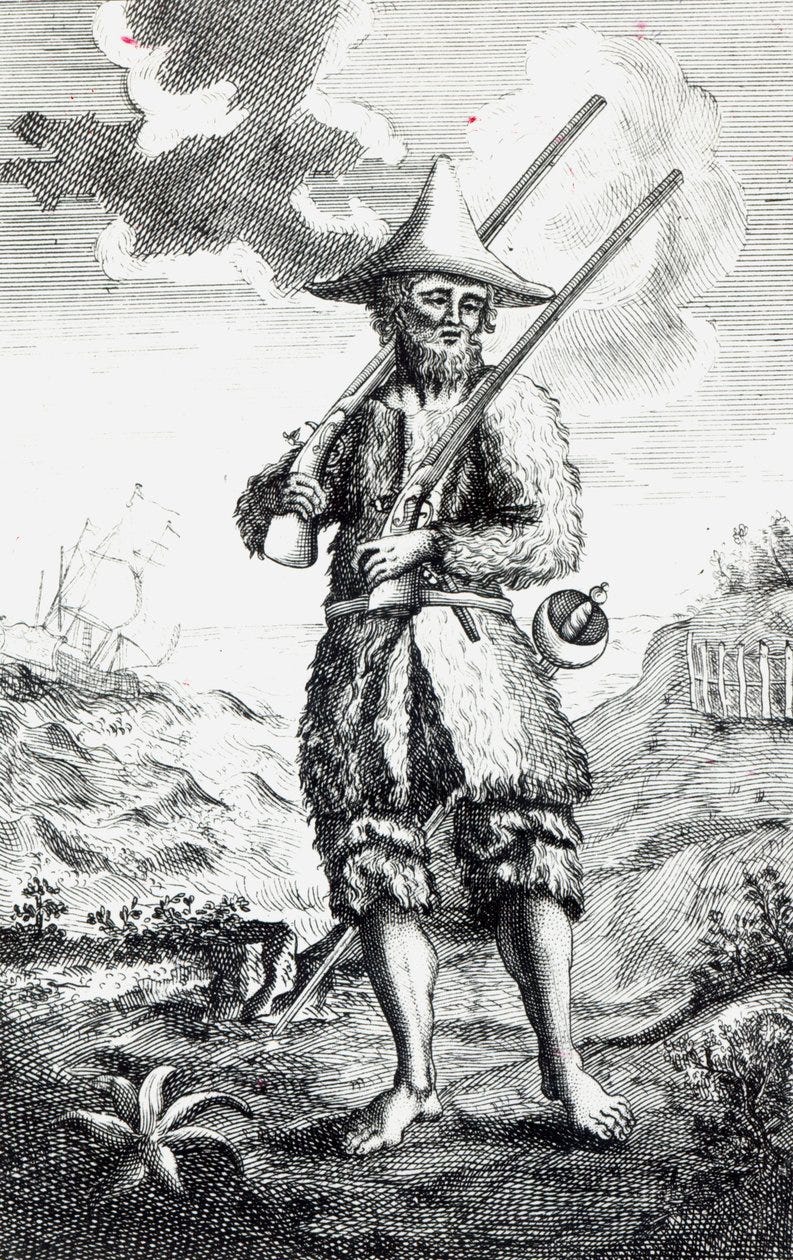‘I was born in the Year 1632, in the City of York, of a good Family, tho’ not of that Country, my Father being a Foreigner of Bremen, who settled first at Hull’
Today we start reading Daniel Defoe’s Robinson Crusoe, one of the most influential and widely published books of all time. Jean-Jacques Rousseau called it ‘a complete treatise on natural education’; James Joyce saw Defoe as ‘the great precursor of the realist movement’; for Virginia Woolf, Robinson Crusoe displays a ‘genius for fact’ that can achieve effects ‘beyond any but the great masters of descriptive prose’.
I look forward to reading this early eighteenth-century masterpiece with you over the next four weeks. All the details are here.
Robinson Crusoe is sometimes described as the first English novel.
There are other contenders, of course, but Robinson Crusoe’s claim to be the starting point of the modern novel was set out persuasively – and enduringly – by the Anglo-American critic Ian Watt, in his influential book The Rise of the Novel (1957).
Watt starts by demonstrating how the seventeenth-century philosopher René Descartes gave rise to the modern assumption ‘whereby the pursuit of truth is conceived of as a wholly individual matter, logically independent of the tradition of past thought, and indeed as more likely to be arrived at by a departure from it.’
The novel is the form of literature which most fully reflects this individualist and innovating reorientation. Previous literary forms had reflected the general tendency of their cultures to make conformity to traditional practice the major test of truth: the plots of classical and renaissance epic, for example, were based on past history or fable, and the merits of the author’s treatment were judged largely according to a view of literary decorum derived from the accepted models in the genre. This literary traditionalism was first and most fully challenged by the novel, whose primary criterion was truth to individual experience – individual experience which is always unique and therefore new. The novel is thus the logical literary vehicle of a culture which, in the last few centuries, has set an unprecedented value on originality, on the novel; and it is therefore well named. [. . .]
Robinson Crusoe falls most naturally into place, not with other novels, but with the great myths of Western civilisation, with Faust, Don Juan and Don Quixote. All these have as their basic plots, their enduring images, a single-minded pursuit by the protagonist of one of the characteristic desires of Western man. Each of their heroes embodies an arete [excellence] and a hubris [pride], an exceptional prowess and a vitiating excess, in spheres of action that are particularly important in our culture. Don Quixote, the impetuous generosity and the limiting blindness of chivalric idealism; Don Juan, pursuing and at the same time tormented by the idea of boundless experience of women; Faustus, the great knower, his curiosity always unsatisfied, and therefore damned. Crusoe, of course, seems to insist that he is not of their company; they are very exceptional people, whereas anyone would do what he did, in the circumstances. Yet he too has an exceptional prowess; he can manage quite on his own. And he has an excess: his inordinate egocentricity condemns him to isolation wherever he is.
The egocentricity, one might say, is forced on him, because he is cast away on an island. But it is also true that his character is throughout courting its fate and it merely happens that the island offers the fullest opportunity for him to realise three associated tendencies of modern civilisation – absolute economic, social and intellectual freedom for the individual.
It was Crusoe’s realisation of intellectual freedom which made Rousseau propose the book as ‘the one book that teaches all that books can teach’ for the education of Émile; he argued that ‘the surest way to raise oneself above prejudices, and order one’s judgement on the real relationship between things, is to put oneself in the place of an isolated man, and to judge of everything as that man would judge of them according to their actual usefulness’.
On his island Crusoe also enjoys the absolute freedom from social restrictions for which Rousseau yearned – there are no family ties or civil authorities to interfere with his individual autonomy. Even when he is no longer alone his personal autarchy remains – indeed it is increased: the parrot cries out his master’s name; unprompted Friday swears to be his slave for ever; Crusoe toys with the fancy that he is an absolute monarch; and one of his visitors even wonders if he is a god. [. . .]
Just as the modern study of society only began once individualism had focussed attention on man’s apparent disjunctions from his fellows, so the novel could only begin its study of personal relationships once Robinson Crusoe had revealed a solitude that cried aloud for them. Defoe’s story is perhaps not a novel in the usual sense since it deals so little with personal relations. But it is appropriate that the tradition of the novel should begin with a work that annihilated the relationships of the traditional social order, and thus drew attention to the opportunity and the need of building up a network of personal relationships on a new and conscious pattern; the terms of the problem of the novel and of modern thought alike were established when the old order of moral and social relationships was shipwrecked, with Robinson Crusoe, by the rising tide of individualism.
I look forward to reading the book with you and discussing the shipwreck that leaves Crusoe alone on his island and kick-starts the tradition of the modern novel.
Here are links to our previous Robinson Crusoe posts:
The Schedule (9 June)
Daniel Defoe (23 June)
And if you’re not planning to read Robinson Crusoe with us, remember you can choose to opt out of our conversation. Just follow this link to your settings and, under Notifications, slide the toggle next to ‘Robinson Crusoe’. A grey toggle means you will not receive emails relating to this title.








How many thought games have been played with this theme—If you were stranded on a desert island what one thing would you……?
I can't resist pointing out the endorsement of this book by the character Gabriel Betteredge in Wilkie Collins's The Moonstone: "[S]uch a book as Robinson Crusoe never was written, and never will be written again. I have tried that book for years—generally in combination with a pipe of tobacco—and I have found it my friend in need in all the necessities of this mortal life. When my spirits are bad—Robinson Crusoe. When I want advice—Robinson Crusoe. In past times when my wife plagued me; in present times when I have had a drop too much—Robinson Crusoe. I have worn out six stout Robinson Crusoes with hard work in my service."